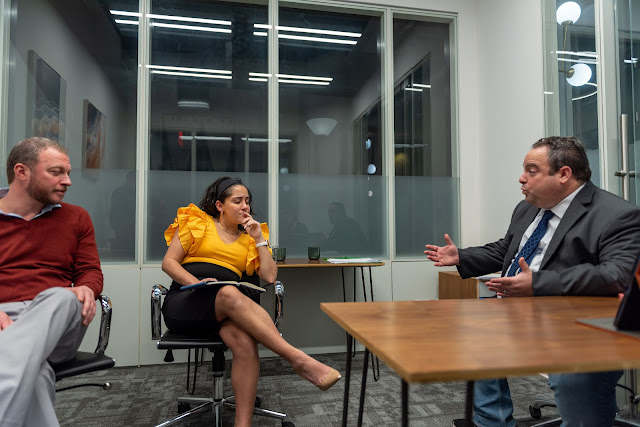Review: In "Canary," Creating a Big Lie Can Be Just Another Day at the Office
Canary
Written by Donald Wollner
Directed by Bree O'Connor
Presented by Playful Substance at the Chain Theatre
312 W 36th St., 4th fl., Manhattan, NYC
January 9-20, 2023
 |
| Dan Kellmer, Yessenia Rivas, & Jason Scott Quinn. "Staff Meeting": Photo Credit: Amanda Lacson |
While the effects of what its characters engage in may ultimately be expansive, Canary keeps its cast small. The play focuses on the creative team of Marty (Dan Kellmer) and Cassie (Yessenia Rivas), who, while successful at producing copy, have not yet reached the heights of the company's true heavy hitters. Cassie is still driven to be the best at what she does, and if Marty sees their work as a living rather than an art–he maintains that what they do is more akin to remixing and gives Cassie Tennessee Williams to read as an exemplar of 'real' writing–he too wants to succeed and be recognized, especially by an advertising award. Therefore, when their superior Ira (Jason Scott Quinn)–a conduit between them and the highest of higher-ups and a man whom Marty likens to a hurricane (a comparison that Quinn's performance largely and entertainingly substantiates)–brings them an opportunity to help sell what he describes as absolute bullshit to the public for a mysterious client, Marty and Cassie are put in the complicated position of deciding whether what they were hoping for is in fact what they actually want.
The production richly mines the tension between the satisfaction of the creative process and the ends to which it is put. We see Marty and Cassie workshopping, reaching that point of inspiration, and refining the results (which certainly seems to parallel the artistic process, at least for some), and the texture and energy in Kellmer and Rivas's performances invest us in each step of these journeys alongside Marty and Cassie. The rush from overcoming creative challenges is not lessened, and may even be increased, when Ira asks for results while responding to most of their questions about the big new client with "No can say." At the same time, the pair's successes are consistently shadowed by doubts. The play opens with Marty trying to confirm whether he unconsciously stole an idea from a magazine, and, likely more importantly, Cassie second-guesses a tagline that they are both excited about when she thinks about how the girl in the photo that will feature in the ad is a real person, much as she will later second-guess whether she has the desire to be a heavy hitter in the industry. Additionally, a request that they change the word "soldiers" in another piece of copy points towards questions of ethics, lying, and the limits of "it's a story" as a justification that will intensify around the opportunity for their big break. As all of this unfolds, Cassie's canary status is cleverly embodied (and skillfully performed) in ways other than her yellow blouse.
While speaking to how easy it can be to persuade people to support something that is against their own interests, Canary keeps its central mysteries engagingly close to its vest until quite near the end, and it is trenchantly funny while doing so. While we may not have heeded the warning in the past (re)created by the play, we can hope that it is not yet entirely too late.
-John R. Ziegler and Leah Richards



Comments
Post a Comment